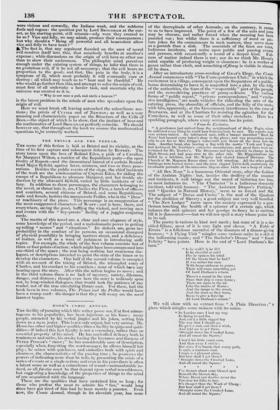TUE PRINCE AND TUE PEDLAR.
THE scene of this fiction is laid at Bristol and its vicinity, at the time of its first capture and subsequent defence by RUPERT. The story turns upon the love of Roland Eden a pink of a Cavalier, for Margaret Wilton, a maiden of the Republican party—the open rivalry of Rupert—and the demoniacal hatred of a certain Round- head Major Byfield, against lover, mistress, and two or three gene- rations. Besides the public events of the siege, the chief incidents of the work are the condemnation of Captain Eden, for aiding the escape of a Republican to pleasure Margaret, and her double ab- duction by the aforesaid Bytield, varied by little incidents of vil- lany. In addition to these personages, the characters belonging to the novel, or thrust into it, are, Charles the First, a batch of officers and courtiers, several citizens of Bristol, and some Republicans, male and female, besides the masquerade Pedlar, who is the "Deus" or machinery of the piece. This personage is an exaggeration of the most exaggerated characters of SCOTT; and is here, there, and everywhere, saving the good, baffling the wicked, and moving men and events with the "hey-presto" facility of a juggler conjuring cards.
The merits of this novel are, a clear and easy elegance of style, some knowledge of the period, and a melodramatic power in getting up telling " scenes" and "situations." Its defects are, gross lin- probability in the conduct of its persons, an occasional disregard of physical possibility in bringing matters about, and a deficiency of matter, as well as a want of judgment in introducing unfit topics. For example, the whole of the first volume consists but of three or four points ()faction; which might have been compressed into one-third of the space ; the rest being nothing but wearisome dia- logues, or descriptions intended to paint the state of the times or to develop the characters. One half of the second volume is occupied with an account of the taking of Bristol, the triumphal entry of Charles, and his conduct to his courtiers ; none of which have any bearing upon the story. After this the action begins to move ; and in the third volume there is no lack of mystery, variety, dilemma, danger, and distress ; though even here the story is tediously spun out, by long-winded dialogues, that would task the patience of any reader, not of the true circulating library cast. For them, had the book been in two volumes, The Prince and the Pedlar would have been a trump card : the danger is that they will weary ere the novel interest begins.


























 Previous page
Previous page